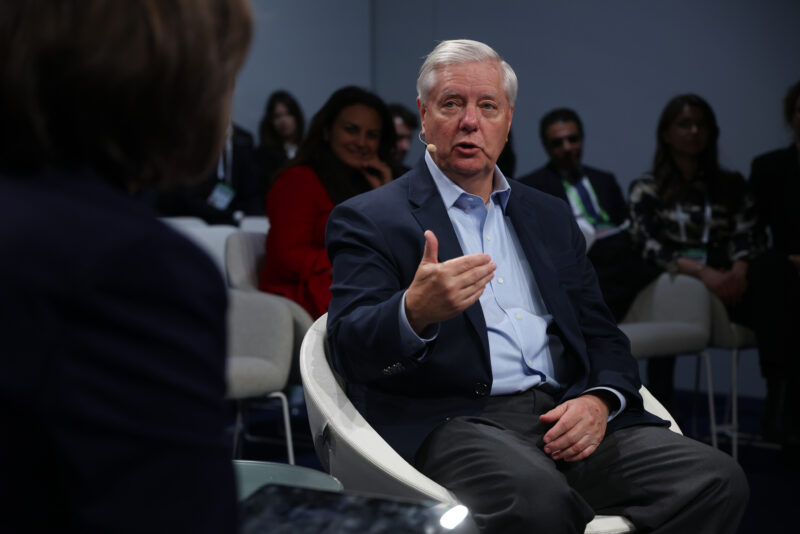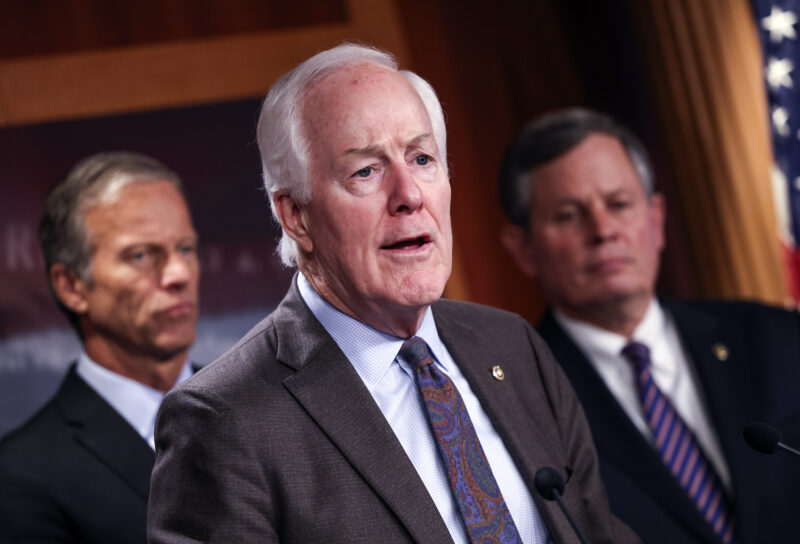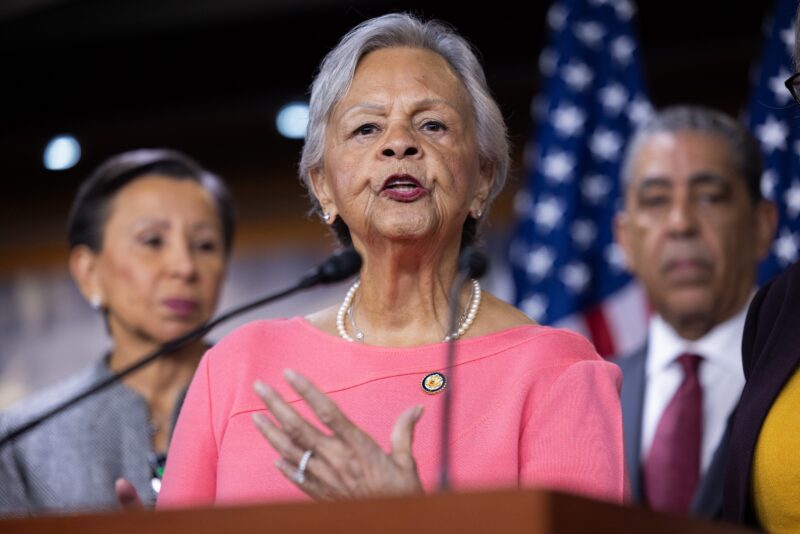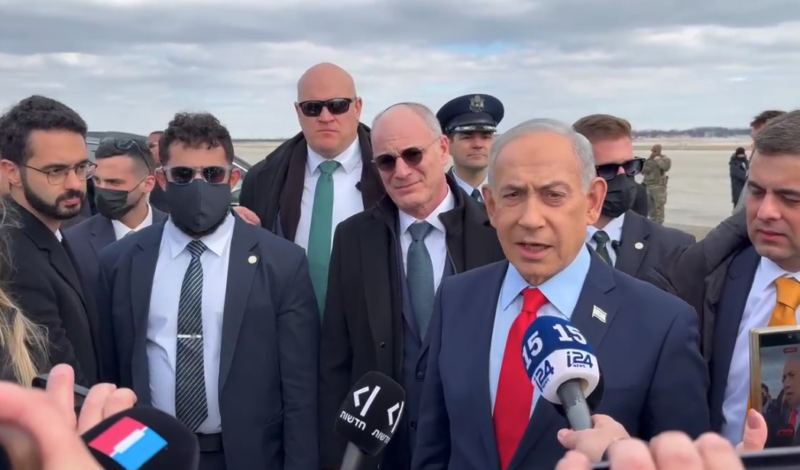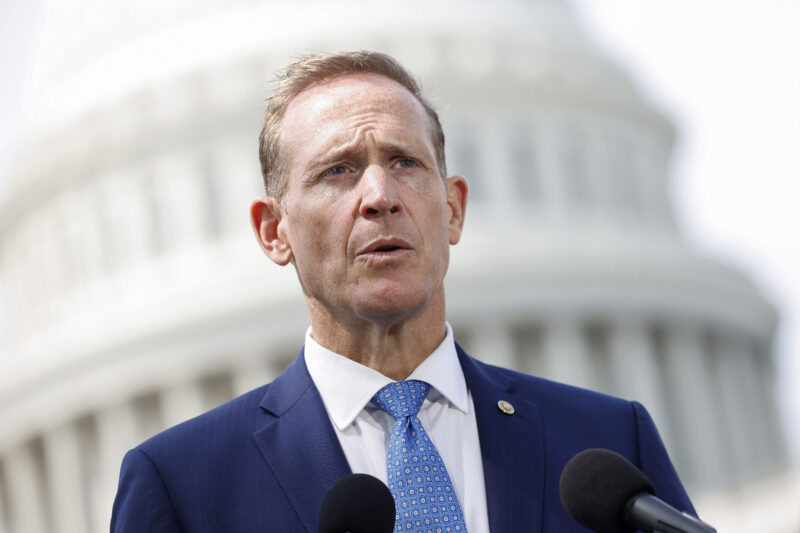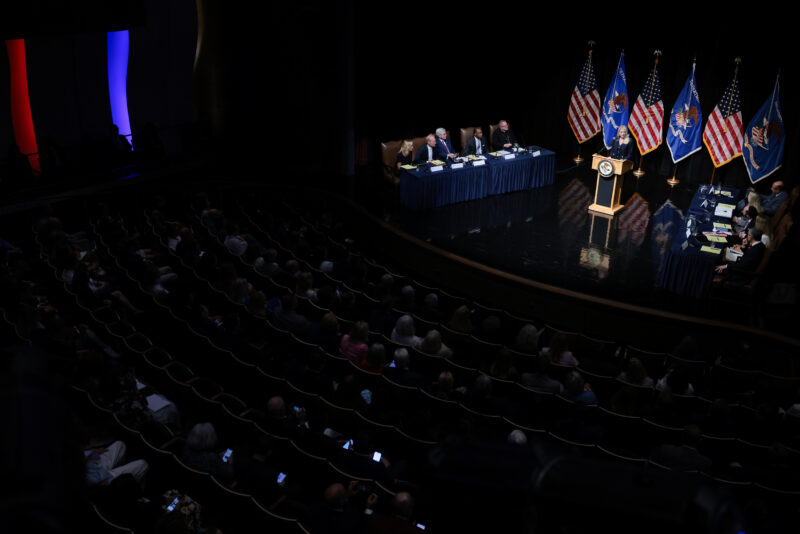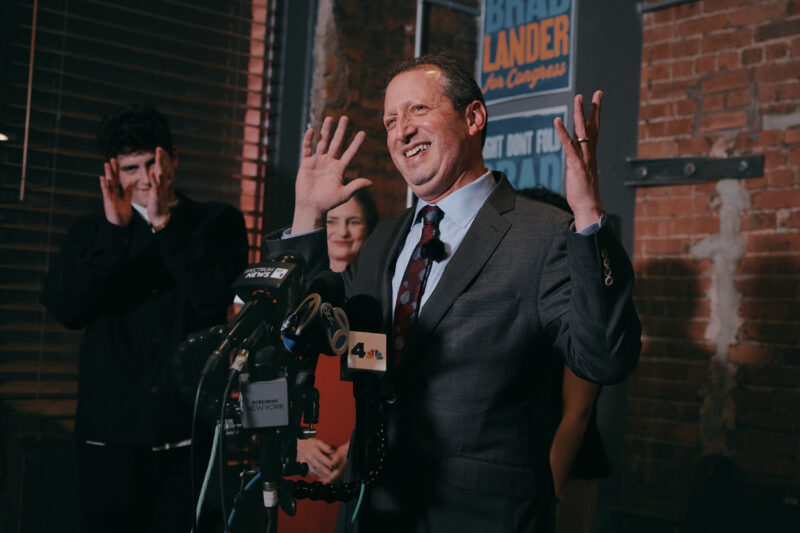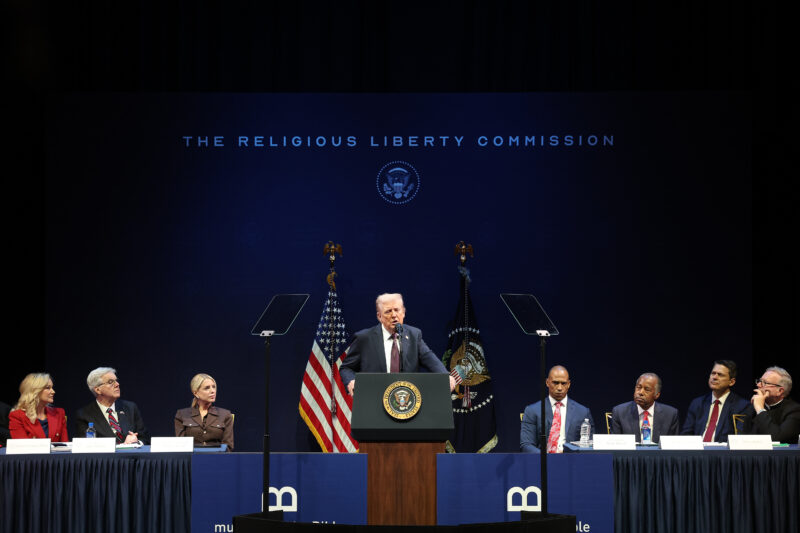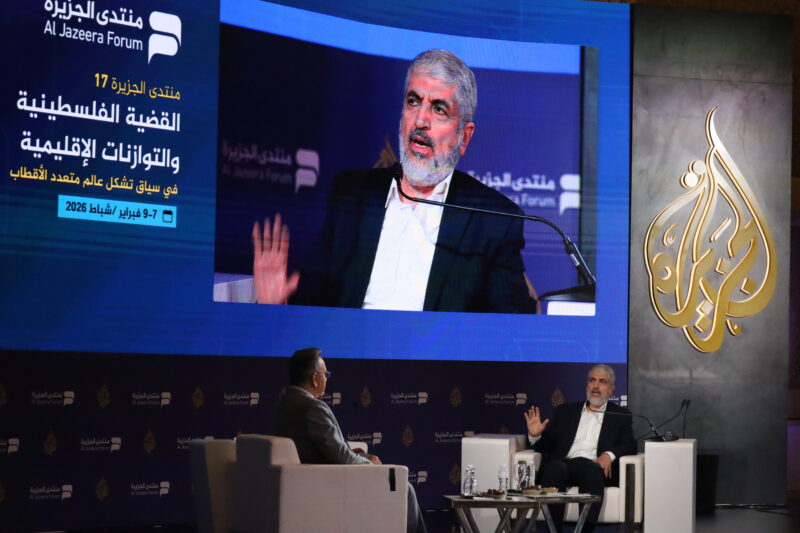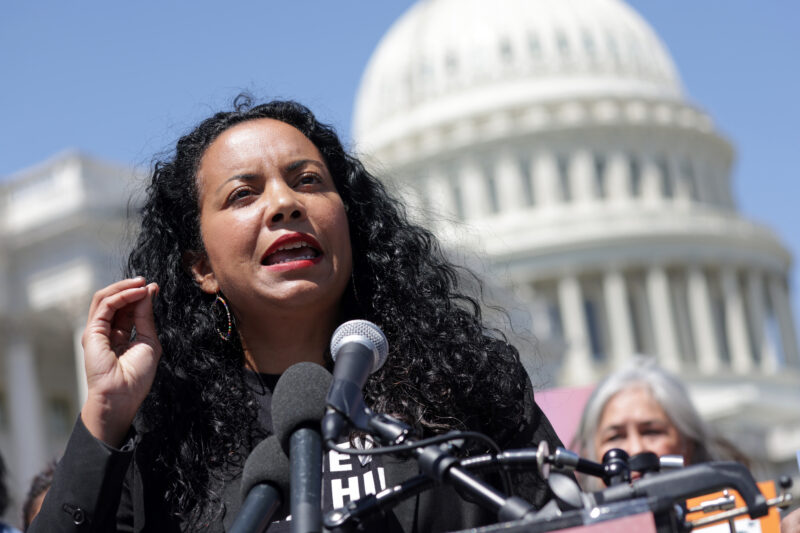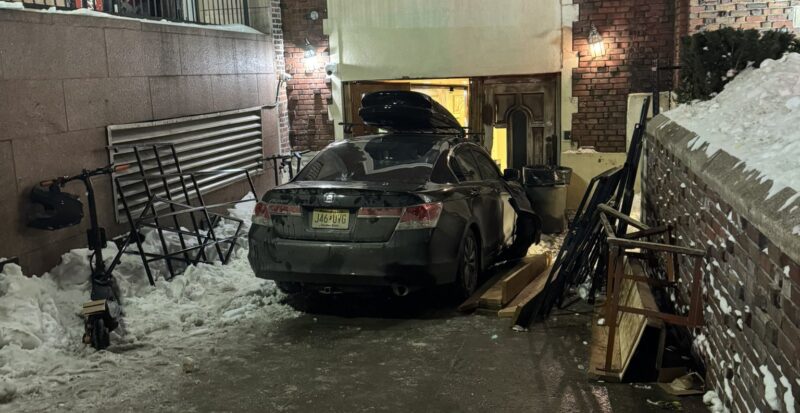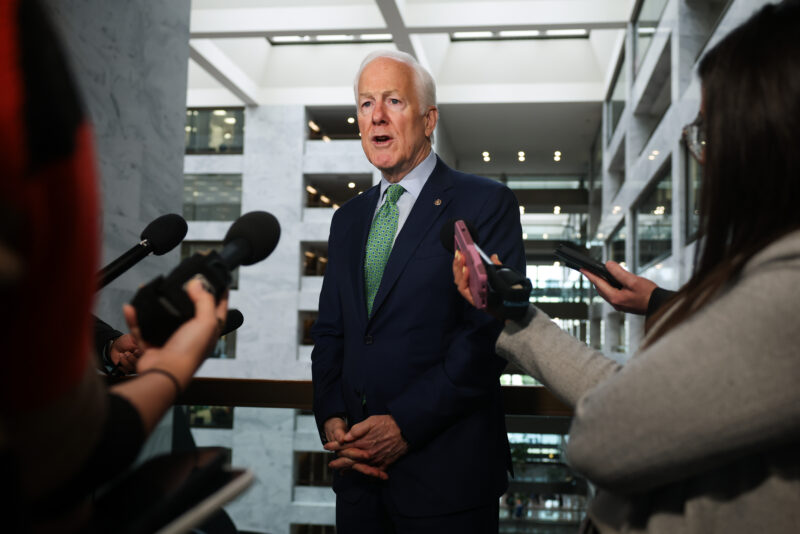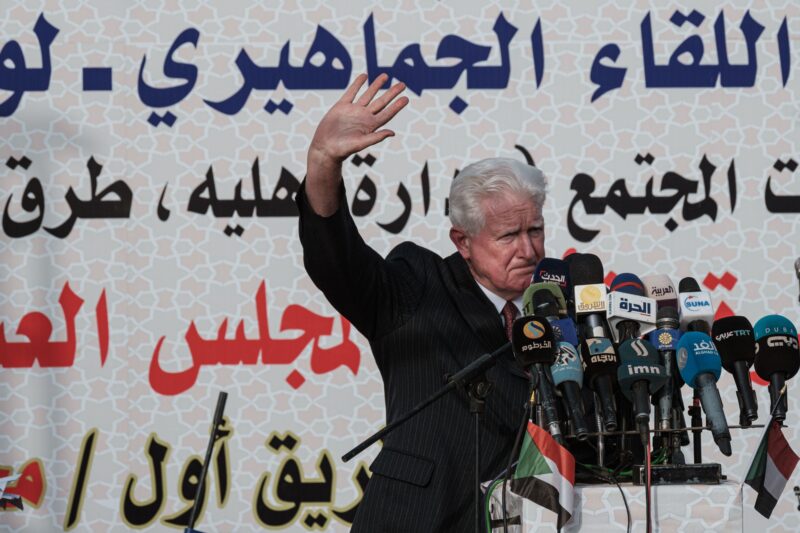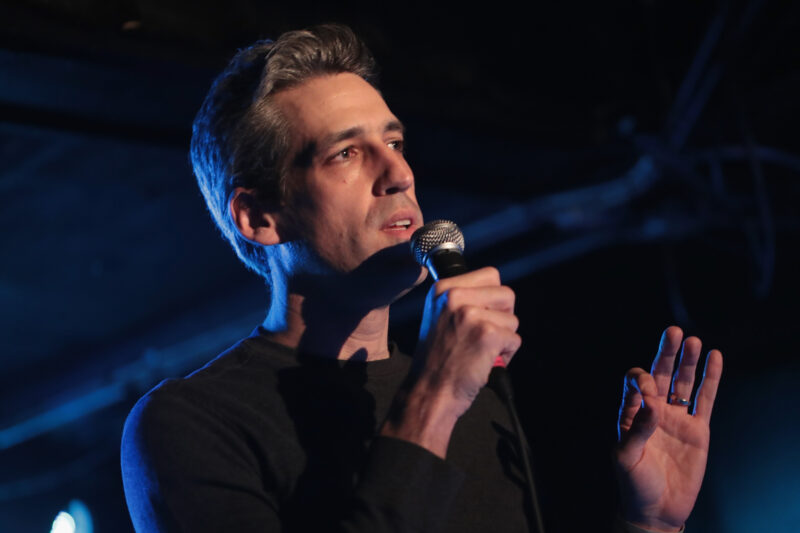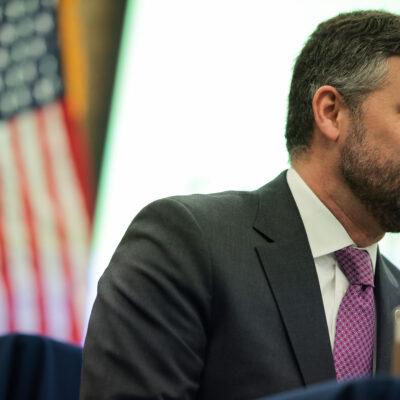Trump, Hill Republicans back Israeli strikes in Gaza over ceasefire violations
Some Senate Democrats voiced concern over the stability of the ceasefire agreement and Israel’s commitment to abiding by it

Samuel Corum/Sipa/Bloomberg via Getty Images
President Donald Trump during a Cabinet meeting at the White House in Washington on Oct. 9, 2025.
President Donald Trump defended Israeli Prime Minister Benjamin Netanyahu’s decision to order what the prime minister called “forceful” strikes on Hamas targets in Gaza on Tuesday in response to ceasefire violations by the terror group, dismissing concerns that the actions could upend the deal.
“They killed an Israeli soldier, so the Israelis hit back and they should hit back. When that happens, they should hit,” Trump told reporters aboard Air Force One on Tuesday evening. “Hamas is a small thing, but they kill people. They grew up killing people, and I guess they don’t stop. Nobody knows what happened to the Israeli soldier, but they say it was sniper-fire and it was retribution for that. I think they have a right to do that.”
“Nothing’s going to jeopardize that [the ceasefire],” he continued. “Hamas is a very small part of peace in the Middle East, and they have to behave. They’re on the rough side, but they said they would be good, and if they’re good, they’re going to be happy. If they’re not good, they’re going to be terminated. Their lives will be terminated, and they understand that.”
The Associated Press reported at least 80 killed in the strikes, including dozens of children. The Israeli army said it had hit dozens of terror targets and struck over 30 terrorists holding command positions within terrorist organizations operating in Gaza.
Initial reaction to Netanyahu’s decision to strike in Gaza fell largely along party lines, with Israel’s Republican allies in the Senate defending the Jewish state’s actions as self-defense while Democrats expressed concerns that the ceasefire in Gaza could be in jeopardy.
“You’re going to see a lot of this,” Sen. John Kennedy (R-LA) told Jewish Insider of the renewed skirmishes in Gaza. “I mean, the Hamas soldiers are not terribly civilized, and the fact that there’s a ceasefire is of no moment to many of them. You’re periodically going to see them continue to shoot at the Israeli soldiers, and when they do, the Israeli soldiers are going to shoot back and kill them.”
“Eventually the really stupid Hamas members will stop doing it, because they’ll be dead,” the Louisiana senator continued. “But this is gonna happen. I mean, you’re not talking about sane people.”
Sen. Pete Ricketts (R-NE) suggested “we ought to expect” the Israelis to still conduct operations in Gaza given Hamas’ actions targeting IDF troops and Palestinian civilians since the ceasefire went into effect.
“Hamas is a terrorist organization. They are going to continue to commit acts of violence, and Israel is going to need to respond,” Ricketts told JI. “That’s why it’s imperative that the Gulf states work together to get an international police force to be able to keep peace in Gaza while we go through this transition.”
Sen. James Lankford (R-OK) said he felt it was “entirely appropriate” that Israel struck Hamas targets in order to protect Israeli forces.
“Because Hamas is attacking the IDF, that is entirely appropriate for Israel to defend itself — today, yesterday, tomorrow. If Hamas is attacking them, violating, obviously, the ceasefire and attacking IDF soldiers, Israel has been very clear: If you shoot us, we’re going to actually stop you,” Lankford told JI.
Sen. Lindsey Graham (R-SC), who offered his support for further Israeli confrontation with Hamas earlier this week, wrote on X on Tuesday afternoon that he was in “total support” of “the recent military action by Israel against Hamas.”
“Without Hamas being disarmed and removed from power permanently, there will be no pathway to stability and peace in the Middle East. Hamas is killing their opposition and consolidating their power,” Graham wrote. “If Israel believes it is necessary to reengage Hamas militarily, so be it. They have my complete backing.”
Sen. Rick Scott (R-FL) concurred with his GOP colleagues, telling JI, “If Hamas is going to strike Israel, they [Israel] don’t have a choice. They have to strike back. It’s too bad, but they don’t have a choice.”
Sen. Mike Rounds (R-SD) surmised that Israel launched the strikes because Hamas was not honoring their side of the ceasefire deal by refusing to disarm.
“I think the reasoning for it was: Hamas is supposed to be planning on disarming, but I suspect that there’s probably some portions of Hamas that don’t want to disarm, and they’re probably regrouping,” Rounds told JI. “If [Netanyahu] can take out some more of those terrorists, I think he probably decided he would do it now as opposed to later.”
“We want that ceasefire to be successful, but it means Hamas has got to give up their weapons,” he added.
Sen. Ted Budd (R-NC) wrote on X on Tuesday that, “Hamas is in direct violation of the ceasefire, including deceptively & cruelly obstructing the return of deceased hostages to their families. The @IDF’s actions are a result of Hamas’ repeated violations & their targeting of Israeli troops.”
The North Carolina senator declined to elaborate when asked by JI at the Capitol about the developments, noting that he wanted to hold off on commenting further until he had been fully briefed on the situation.
Some Senate Democrats who have been critical of Israel’s actions in Gaza since Hamas’ Oct. 7, 2023, attacks on the Jewish state said they hoped the latest developments would not completely upend the ceasefire deal.
“It is very troubling,” Sen. Tim Kaine (D-VA) said of Netanyahu launching the strikes. “I give President Trump a lot of credit for really working hard to get him [Netanyahu] to accept the deal. He wouldn’t have accepted it before.”
Kaine questioned if Netanyahu was aiming to derail the ceasefire, and noted that such a development would upend current efforts by the U.S. to bring more Gulf states into the Abraham Accords.
“My question is: Is he trying to undo the deal?” the Virginia senator asked of Netanyahu. “If he’s trying to undo the deal, then he’s got another problem, which is [that] they [the U.S.] want more nations in the Abraham Accords, and those nations have said we’re not coming in unless there is a path forward to Palestinian autonomy.”
Sen. Mark Kelly (D-AZ) told JI that he was waiting to be briefed before speaking publicly, but said it would be “unfortunate if we wound up in a situation where this unravels.”
Middle East experts with whom JI spoke described Israel’s strikes against Hamas as necessary for its security, and dismissed concerns that Israel was acting without U.S. involvement or trying to disrupt the deal, while others expressed concern regarding Washington’s ability to constrain the Israelis.
“Israel has shown considerable patience and restraint in the face of multiple Hamas violations of its ceasefire obligations, but attacks on its personnel are something no government can accept,” Rob Satloff, executive director of The Washington Institute for Near East Policy, told JI. “Hamas’ violations are real and serious, deserving of an appropriate response.”
Mona Yacoubian, director and senior advisor of the Middle East Program at the Center for Strategic and International Studies, remained skeptical over Israel’s decision to strike. She said the operation could reflect a developing pattern where Israel takes military action with or without U.S. cooperation, and argued that Washington should be willing to adjust accordingly to “enforce” and monitor the ceasefire arrangement.
“Although we are still very much in the ‘fog of war,’ it does not appear that the United States approved the strike or necessarily even agrees with Israel’s interpretations that Hamas violated the ceasefire,” Yacoubian told JI. “We are likely seeing the beginnings of a ‘new normal’ where Israel strikes as it sees necessary. The key question is whether or not the United States will acquiesce to that.”
Gaith al-Omari, a senior fellow at The Washington Institute, predicted that the breakout of strikes was an isolated episode that would be “contained.”
“The current escalation is concerning but not surprising. Ceasefires take a while to solidify and stabilize, whether because of accidents or because the sides testing the limits of the ceasefire,” al-Omari said. “The challenge facing the U.S. now is how to balance supporting Israel’s right to respond to Hamas’ violations while at the same time ensuring that this round of escalation does not spin out of control.”
Please log in if you already have a subscription, or subscribe to access the latest updates.




